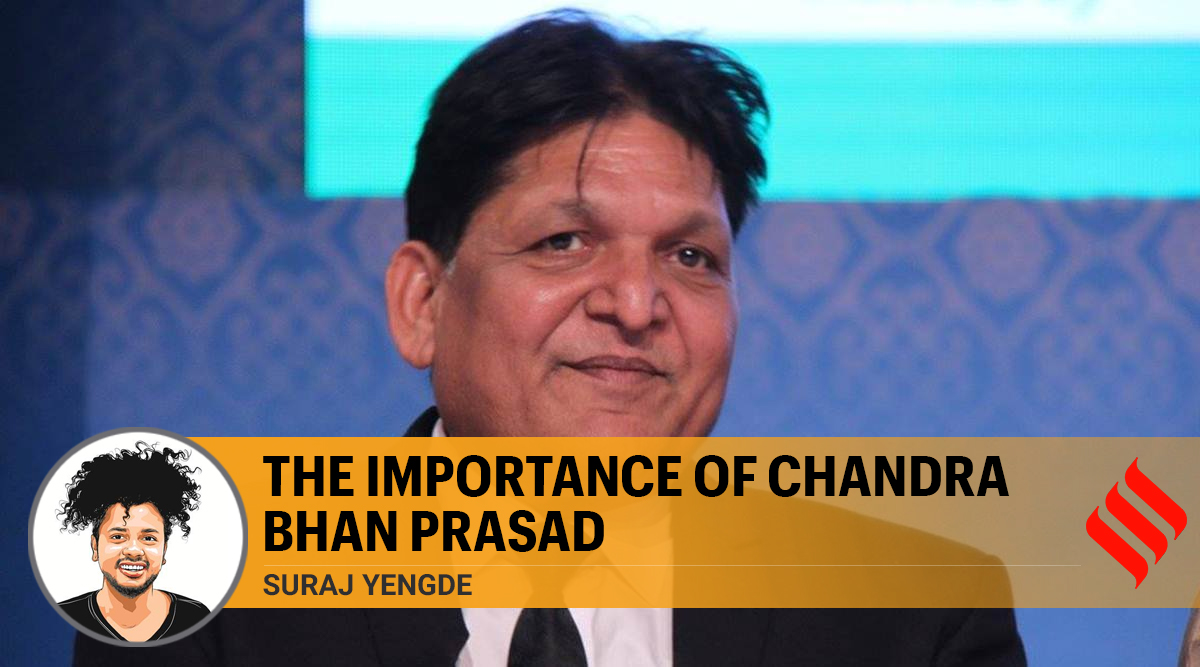 Chandra Bhan Prasad (Source: Facebook/@pioneercbp )
Chandra Bhan Prasad (Source: Facebook/@pioneercbp )Dalitality will be incomplete if it doesn’t honour my predecessor, Chandra Bhan Prasad, a shining thought leader and India’s leading public intellectual. At a time when Dalits were barely noticed, CBP was our eyes and ears. He was our man, dressed in a soigné suit, sharp black tie and handsomely combed hair. Sitting in the studios or penning his philosophy, CBP gave us reasons to be proud and assured.
CBP is known to the world for his stellar work as a columnist in The Pioneer. He was the first Dalit in independent India to have a dedicated column space in the English press. His popular column, Dalit Diary, came at a time when newer interventions in India’s changing geography were desperately needed.
Born in 1958 in Bhadwan village in Azamgarh, Uttar Pradesh, CBP began writing as the last decade of the 20th century dawned. His life at Jawaharlal Nehru University was shaped by the radical uptightness of Dalit exploitation. He found a pathway to articulate the simmering anger through the CPI (M-L) outpost. After paying closer attention to this politics, and the politics of the liberal and progressive, CBP chose to expose their hypocrisies through honesty. He took upon the liberals and progressives both in the urban and rural scape. His targets were the influential class who were articulating public opinion — professors, editors, columnists and Leftist feudalists. In many ways, Dalit Diary was a vicissitude for these people, who talked about Dalit liberation but also held on to beliefs of their varna privileges. CBP’s openness to limited private capital came from his reading of Ambedkar and that of Mao, wherein nationalist bourgeoisie were given adequate space in China after the 1949 revolution till 1956.
The much-hyped Bhopal Declaration which brought together Dalit academics, thinkers and babus to frame a policy of diversity had token success. It created a buzz but the results are still to be seen across a wide spectrum. However, the credit to articulate that idea and bring about new perspectives can be attributed to CBP. He is the father of India’s diversity movement who argued for an increase in colours to the monochrome of what he called “varna viciousness”.
CBP utilised his glamour and name to advance the Dalit cause. He toyed with new ventures and this is what brought him to propose Dalit Capitalism — a radical imagination finding avenues at the centres of liberal structures. He was a pragmatic uncle who advised Dalit movements to “seek share in globalisation” instead of “wasting resources, time and talent in trying to stop the unstoppable”.
His reasoning for a capitalist solution was his active position against the twice-born Left and Sangh. Both these cronies are united in keeping the position of Dalits permanent subordinate. He was cognizant that American imperialism was going to hit vulnerable Dalits, but what would a landless Dalit labourer think of his landlord who has been tormenting him for generations? “What could be a happier moment for Dalits than witnessing the total collapse of farmers (landlords) who do not pay minimum wages and humiliate Dalits in their day-to-day life?” Those ruling classes of India did not democratise resources such as education. Thus, he advised Dalits to “pray for the collapse of desi industrialists”. He took this position from two vantage points: 1. He hoped the MNCs would open up space for Dalits like they did for the Black population in America. 2. Empire had a history of turning fruitful for India’s Dalits.
Although his Dalit Capitalism is an admirable concept, it needs detailed scrutiny and much more critical understanding.
CBP’s columns were deeply sociological and showed literary command. He believed in the power of the English language, which allowed him a higher status. He wanted the same for his community. He remains a strong advocate of the Dalit English language movement.
In his feisty reprimand of the twice-borns, CBP held up no filters for Dalits either. He felt the Dalit movement’s singular focus on Brahmins as enemy No. 1 was wrongly placed, especially when, since Independence, the upper Shudras had claimed dominance in India. Thus, the “principal contradiction of our times” was between “Dalits and upper Shudras”.
CBP fronted attacks and counter-punched detractors for berating Dalits, taking on anyone trying to pull them down. His new ventures “Dalit Food” and “Dalit Entrepreneurship” are thought-provoking and inspiring. Needless to say, also entertaining.
This article first appeared in the print edition on September 20, 2020 under the title ‘The importance of Chandra Bhan Prasad’. Suraj Yengde, author of Caste Matters, curates the fortnightly ‘Dalitality’ column
📣 The Indian Express is now on Telegram. Click here to join our channel (@indianexpress) and stay updated with the latest headlines
For all the latest Opinion News, download Indian Express App.